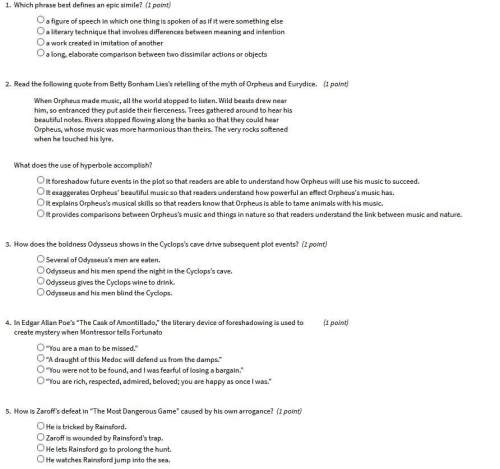
PLEASE HELP!!
Now you must know that a Town Mouse once upon a time went on a visit to his cousin in the country. He was rough and ready, this cousin, but he loved his town friend and made him heartily welcome. Beans and bacon, cheese and bread, were all he had to offer, but he offered them freely. The Town Mouse rather turned up his long nose at this country fare, and said: "I cannot understand, Cousin, how you can put up with such poor food as this, but of course you cannot expect anything better in the country; come you with me and I will show you how to live. When you have been in town a week you will wonder how you could ever have stood a country life." No sooner said than done: the two mice set off for the town and arrived at the Town Mouse's residence late at night. "You will want some refreshment after our long journey," said the polite Town Mouse, and took his friend into the grand dining-room. There they found the remains of a fine feast, and soon the two mice were eating up jellies and cakes and all that was nice. Suddenly they heard growling and barking. "What is that?" said the Country Mouse. "It is only the dogs of the house," answered the other. "Only!" said the Country Mouse. "I do not like that music at my dinner." Just at that moment the door flew open, in came two huge mastiffs, and the two mice had to scamper down and run off. "Good-bye, Cousin," said the Country Mouse, "What! going so soon?" said the other. "Yes," he replied; "Better beans and bacon in peace than cakes and ale in fear."
1
Select the correct answer.
What can you most reasonably infer, or conclude, from this fable by Aesop?
A.
The Country Mouse is jealous of the Town Mouse’s fancy lifestyle.
B.
The Country Mouse is warm and generous despite his simple lifestyle.
C.
The Town Mouse is lonely, so he wants the Country Mouse to join him.
D.
The Country Mouse is bored with his ordinary, routine life in the country.
Reset Next

Answers: 2


Another question on English

English, 21.06.2019 16:30
In walt whitman's attitude toward death in "song of myself" differ from dickinson's attitude in "712: because i could not stop for death"?
Answers: 1

English, 21.06.2019 23:10
2read this passage from "the raven." what is puzzling the speaker in this stanza? 60% but the raven still beguiling my sad fancy into smiling, straight i wheeled a cushioned seat in front of bird, and bust and door then, upon the velvet sinking, i betook myself to linking fancy unto fancy, thinking what this ominous bird of yore- what this grim, ungainly, ghastly, gaunt and ominous bird of yore meant in croaking "nevermore." s and what the raven's message is why the raven came to visit where the raven came from how the raven got into his room
Answers: 3

English, 21.06.2019 23:10
Which values of the ancient greeks are most emphasized in the excerpt?
Answers: 1

English, 22.06.2019 03:00
9. types of literature that are told from a point of view include autobiographies, memoirs, diaries, and journals.
Answers: 1
You know the right answer?
PLEASE HELP!!
Now you must know that a Town Mouse once upon a time went on a visit to his cousin in...
Questions



Mathematics, 16.03.2020 23:56


Biology, 16.03.2020 23:56

Mathematics, 16.03.2020 23:56

History, 16.03.2020 23:56



History, 16.03.2020 23:56


Mathematics, 16.03.2020 23:56

Business, 16.03.2020 23:56




Mathematics, 16.03.2020 23:57

Mathematics, 16.03.2020 23:57





